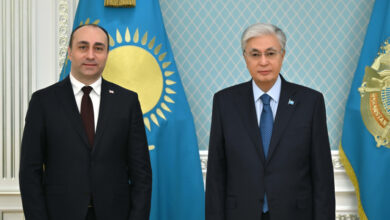
In the year 2023, a notable 21,325 ethnic Kazakhs returned to Kazakhstan, marking a continued trend in the repatriation of this community to their historical homeland. Since 1991, an impressive 1,128,300 ethnic Kazakhs have returned to the republic.
Last year, more than half of the returning individuals with ‘Kandas’ status (50.3%) arrived from Uzbekistan, followed by 21.5% from China, 10.2% from Mongolia, 9.2% from Turkmenistan, 6.8% from Russia, and 2% from other countries.
As of January 1, 2024, the demographic breakdown of ethnic migrants reveals that 60.2% are of working age, 30.9% are minors, and 8.9% are pensioners.
Among the working-age individuals, 15.3% hold higher education, 32.4% possess secondary specialized education, 44.3% have completed general secondary education, and 8% have no formal education.
The returning ethnic Kazakhs have settled in various regions of the republic, with a strategic focus on labor-scarce areas identified for Kandas resettlement, including Akmola, Abay, Kostanay, Pavlodar, East, and North Kazakhstan regions.
By January 1, 2024, 2,337 Kandas had been successfully resettled in these regions, aligning with the approved quota for the year 2023. These individuals are entitled to state support measures, including a relocation subsidy of 70 Monthly Calculation Indices (MCI) – equivalent to 241,500 tenge in 2023 – for the head of the family and each family member. Additional monthly support ranging from 15 to 30 MCI (51,700 to 103,500 tenge in 2023) is provided for housing rental and utility expenses over the course of a year.
In 2023, various support measures were extended to 2,126 candidates, including permanent employment for 735 individuals, one-time subsidies for 2,126 people, and housing cost subsidies for 694 Kandas.
To enhance the efficiency of voluntary resettlement, institutional measures have been implemented to support employers involved in the relocation process to the northern regions. An economic mobility certificate, covering 50% of housing costs or up to 4 million tenge per family, has been introduced to support the purchase or construction of housing, or to cover part of the down payment on mortgage housing loans.
Notably, in 2023, a pilot mechanism for assigning ‘Kanda’ status was implemented on the “one window” principle through Kazakhstan’s embassies. This approach streamlines the process of addressing concerns such as visiting the country, securing employment, housing provisions, and acquiring ‘Kanda’ status without the need to enter the territory of the republic. To date, 6,203 applications from ethnic Kazakhs have been accepted under this new format.



